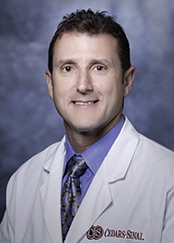Two of California's most well-known providers are teaming up to provide more comprehensive care for patients with congenital heart defects.
Cedars-Sinai Medical Center and Stanford Children's Health announced that they have partnered to treat this patient population through the length of their lives, while sharing expertise and techniques between their cardiac care units.
Evan Zahn, M.D., director of the Guerin Family Congenital Heart Program at Cedars-Sinai's Smidt Heart Institute, told FierceHealthcare in an interview that when one thinks of a patient with a congenital heart defect, one typically imagines a child.

But those patients grow up and age out of pediatric care, Zahn said. It's crucial that they can transition to an adult provider instead of missing out on critical treatment.
"With how long patients are living, it's not really appropriate to just treat babies and children," Zahn said. "This is a lifelong process."
RELATED: A look inside Lucile Packard's new 521K-square-foot 'patient-centered' hospital
Zahn said he came to Cedars-Sinai after working in pediatrics, which highlighted how much pediatric hospitals and hospitals aimed at adults can learn from one another.
For example, Cedars-Sinai performs more heart transplants than any other facility in the world, while Lucile Packard Children's Hospital Stanford has a robust pediatric transplant program, he said. Sharing best practices can improve care at both facilities, he said.
Cedars-Sinai and Stanford each bring unique experience with technology and patient engagement, which could also lead to improvement on both sides, Zahn said.
RELATED: Rival Virginia hospitals see advantages in partnerships over competition
Cedars-Sinai and Stanford will also share physicians. A Stanford Health pediatric heart specialist could be called upon to operate on a young patient at Cedars-Sinai, while Stanford could call in Cedars-Sinai's experts on certain procedures, such as minimally invasive, catheter-based heart procedures.
Another perk of the partnership is location. Because Cedars-Sinai and Stanford Health are not in the same part of California, the two providers can "dumbbell" the state in working together, Zahn said.
Instead of competing directly, distance allows the two to "just raise the game" for patients with heart conditions "across the state," he said.